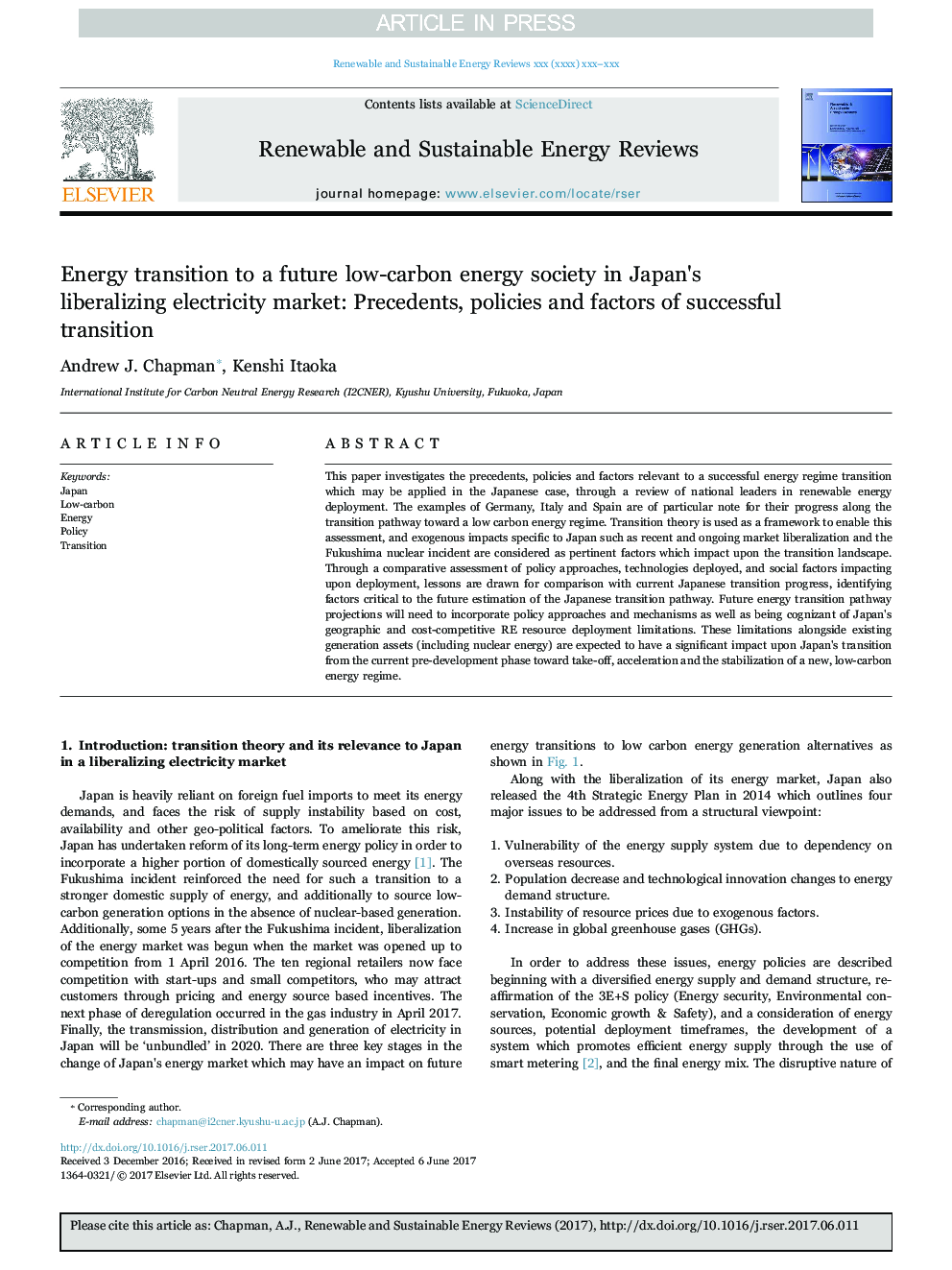| کد مقاله | کد نشریه | سال انتشار | مقاله انگلیسی | نسخه تمام متن |
|---|---|---|---|---|
| 8112217 | 1522305 | 2019 | 9 صفحه PDF | دانلود رایگان |
عنوان انگلیسی مقاله ISI
Energy transition to a future low-carbon energy society in Japan's liberalizing electricity market: Precedents, policies and factors of successful transition
ترجمه فارسی عنوان
انتقال انرژی به یک جامعه انرژی پایین کم کربن در بازار برق لیبرال ژاپن: پیششرط ها، سیاست ها و عوامل انتقال موفقیت آمیز
دانلود مقاله + سفارش ترجمه
دانلود مقاله ISI انگلیسی
رایگان برای ایرانیان
کلمات کلیدی
ژاپن، کم کربن، انرژی، سیاست، گذار،
ترجمه چکیده
در این مقاله سعی می شود سؤال ها، سیاست ها و عوامل مربوط به یک دوره انتقال موفق رژیم انرژی که ممکن است در پرونده ژاپن مورد استفاده قرار گیرد، از طریق بررسی رهبران ملی در زمینه گسترش انرژی تجدید پذیر. نمونه هایی از آلمان، ایتالیا و اسپانیا از پیشرفت های خود در مسیر گذار به یک رژیم انرژی کم کربن یاد شده است. تئوری انتقال به عنوان چارچوبی برای فعال کردن این ارزیابی استفاده می شود و اثرات خارجی آن به ویژه ژاپن مانند آزاد سازی اخیر و در حال انجام بازار و حادثه هسته ای فوکوشیما به عنوان عوامل مرتبط با تاثیر گذار بر چشم انداز در نظر گرفته می شود. از طریق ارزیابی مقایسه ای از رویکردهای سیاست، فن آوری های مستقر و عوامل اجتماعی که بر استقرار تأثیر می گذارند، درس ها برای مقایسه با پیشرفت جاری ژاپن، شناسایی عوامل مهم برای برآورد آینده مسیر ژاپنی، به دست می آید. پیش بینی های مسیر انتقال انرژی آینده نیاز به ترکیب رویکرد ها و مکانیزم های سیاست و همچنین شناخت محدودیت های گسترش منابع اطلاعات جغرافیایی و هزینه های رقابتی ژاپن را دارد. انتظار می رود این محدودیت ها در کنار دارایی های نسل فعلی (از جمله انرژی هسته ای) تأثیر قابل توجهی بر انتقال ژاپن از مرحله پیش توسعه فعلی نسبت به خنک سازی، شتاب گیری و تثبیت یک رژیم انرژی جدید با انرژی کم داشته باشد.
موضوعات مرتبط
مهندسی و علوم پایه
مهندسی انرژی
انرژی های تجدید پذیر، توسعه پایدار و محیط زیست
چکیده انگلیسی
This paper investigates the precedents, policies and factors relevant to a successful energy regime transition which may be applied in the Japanese case, through a review of national leaders in renewable energy deployment. The examples of Germany, Italy and Spain are of particular note for their progress along the transition pathway toward a low carbon energy regime. Transition theory is used as a framework to enable this assessment, and exogenous impacts specific to Japan such as recent and ongoing market liberalization and the Fukushima nuclear incident are considered as pertinent factors which impact upon the transition landscape. Through a comparative assessment of policy approaches, technologies deployed, and social factors impacting upon deployment, lessons are drawn for comparison with current Japanese transition progress, identifying factors critical to the future estimation of the Japanese transition pathway. Future energy transition pathway projections will need to incorporate policy approaches and mechanisms as well as being cognizant of Japan's geographic and cost-competitive RE resource deployment limitations. These limitations alongside existing generation assets (including nuclear energy) are expected to have a significant impact upon Japan's transition from the current pre-development phase toward take-off, acceleration and the stabilization of a new, low-carbon energy regime.
ناشر
Database: Elsevier - ScienceDirect (ساینس دایرکت)
Journal: Renewable and Sustainable Energy Reviews - Volume 81, Part 2, January 2018, Pages 2019-2027
Journal: Renewable and Sustainable Energy Reviews - Volume 81, Part 2, January 2018, Pages 2019-2027
نویسندگان
Andrew J. Chapman, Kenshi Itaoka,
